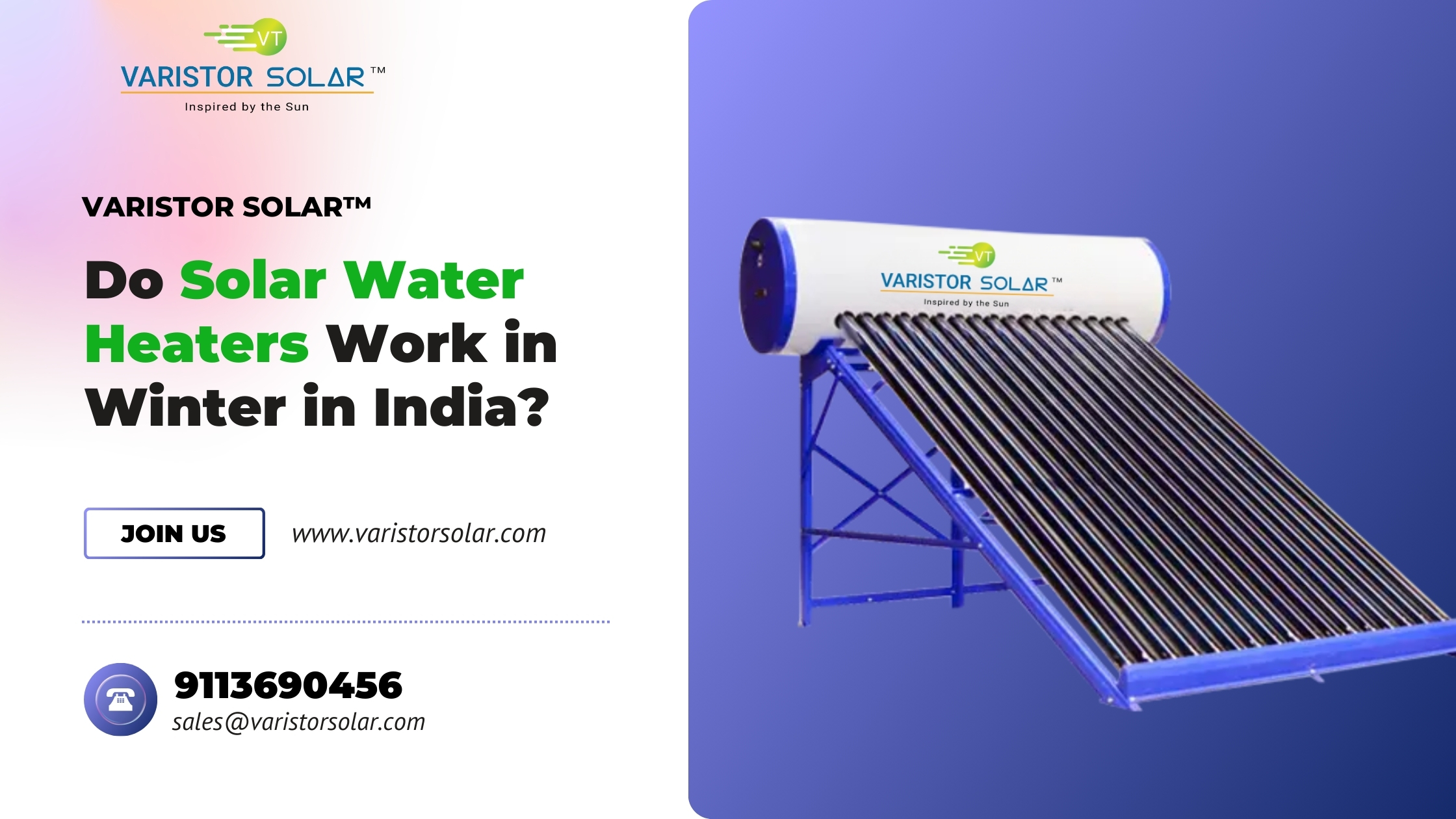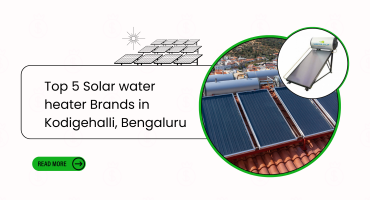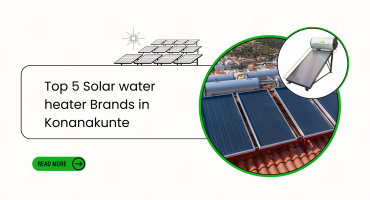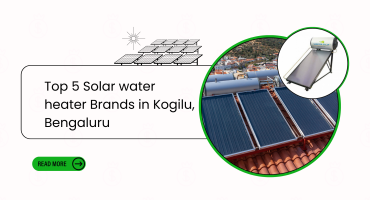
Varistor Solar is dedicated to empowering individuals, businesses, and communities with the transformative power of solar energy. We believe in a brighter, cleaner future and are committed to making sustainable living accessible to everyone.
+91-9113690456
Email: sales@varistorsolar.com
Varistor Solar
NO 40/C, KALKERE VILLAGE,12TH MAIN, NRI LAYOUT,Ramamurthy Nagar, Bangalore North,Bangalore- Karnataka, 560016
India's diverse climate brings a mix of hot summers and chilly winters. With energy costs rising and a greater focus on sustainable living, many are turning to solar energy. One popular application is solar water heating. But does a solar water heater work effectively in winter, especially in India? This beginner's guide explores the ins and outs of solar water heaters, their performance during winter, and how they can be an excellent addition to various settings like homes, PGs, hospitals, guest houses, and apartments. We'll also delve into costs, installation, and maintenance.

Understanding Solar Water Heaters
What is a Solar Water Heater?
A solar water heater captures sunlight to heat water, offering an eco-friendly and cost-effective alternative to traditional water heating methods. It comprises solar panels, a storage tank, and a circulation system. These systems can significantly reduce electricity bills and carbon footprints.
How Does a Solar Water Heater Work?
Solar water heaters use solar hot water panels to capture and convert sunlight into heat. The system circulates water through these panels, where it gets heated by the sun. The heated water is then stored in a tank for later use. There are two main types of solar water heating systems: active and passive. Active systems use pumps to circulate water, while passive systems rely on natural convection.
Solar Water Heaters Work in Winter: Myth or Reality?
Performance of Solar Water Heaters in Winter
Many people wonder if solar water heaters work effectively during winter. The answer is a resounding yes! While efficiency might decrease slightly due to lower sunlight, modern solar water heating systems are designed to perform well even in colder months. They often come with insulated storage tanks and advanced circulation systems to ensure a steady supply of hot water.
Factors Influencing Efficiency
Several factors affect the efficiency of a solar water heater in winter:
- Geographical Location: Areas with more sunlight hours will naturally have better performance.
- Quality of Solar Panels: High-quality panels can capture more sunlight even on cloudy days.
- Insulation: Properly insulated tanks and pipes minimize heat loss.
- Backup Heating Systems: Many systems come with electric or gas backups to ensure hot water availability on very cold or cloudy days.
Benefits of Solar Water Heaters in Various Settings
Solar Water Heater for Home
Installing a solar water heater for home use is an excellent investment. It reduces electricity bills and ensures a constant supply of hot water. Whether you live in a standalone house or an apartment, solar water heaters are versatile and efficient. They are particularly beneficial in areas with frequent power cuts.
Solar Water Heater in Apartment
For apartment dwellers, a solar water heater can be a communal solution. Installing a central system that serves multiple units can be cost-effective and space-efficient. Many modern apartments in India are integrating these systems to promote green living.
Solar Water Heater in Hospital
Hospitals require a significant amount of hot water for various purposes. A solar water heater in a hospital can help reduce operational costs and support eco-friendly practices. Given the 24/7 demand for hot water, solar systems with electric backups ensure reliability.
Solar Water Heater in Guest House
Guest houses can benefit greatly from solar water heaters. They provide a sustainable solution to meet guests' hot water needs while reducing energy expenses. Guests also appreciate eco-friendly amenities, making it a win-win situation.
Solar Water Heater PG
Paying guest accommodations, or PGs, can also utilize solar water heaters. They ensure that all residents have access to hot water without driving up electricity costs. This is particularly advantageous for PG owners looking to offer better facilities without significant overheads.
Costs and Pricing: A Detailed Look
Solar Heater Price
The price of solar heaters varies based on capacity, brand, and installation complexity. While the initial investment might seem high, the long-term savings on energy bills make it worthwhile.
Solar Water Heater 100 Ltr Price
For a standard 100-liter solar water heater, prices typically range from INR 15,000 to INR 25,000. The cost depends on the quality of materials and additional features like electric backup.
Solar Water Heater 150 Ltr Price
A 150-liter solar water heater price ranges between INR 20,000 and INR 30,000. This capacity is suitable for small families or apartments.
Solar Water Heater 200 Ltr Price
For larger households or settings like guest houses, a 200-liter solar water heater price can range from INR 25,000 to INR 40,000.
Solar Water Heater 300 Ltr Price
Hospitals or large PG accommodations might require a 300-liter system. The price for these systems typically starts at INR 35,000 and can go up to INR 50,000.
Solar Water Heater 25 Ltr Price
Mini solar water heaters, with a capacity of around 25 liters, are also available and are perfect for small spaces or single-person use. Prices for these compact systems range from INR 7,000 to INR 10,000.
Choosing the Best Solar Water Heater
Best Solar Water Heater in India
When choosing a solar water heater, consider brands known for quality and reliability. Some of the best solar water heater brands in India include:
- Varistor Solar: Known for its high efficiency and durable systems.
- Tata Power Solar: A trusted name with a wide range of options.
- V-Guard: Popular for their robust and efficient solar water heaters.
Best Solar Water Heater in Bangalore
In Bangalore, where the climate is relatively moderate, brands like Varistor Solar and Tata Power Solar are highly recommended due to their excellent service and reliable performance.
Best Solar Water Heater 200 Ltr Price
For those specifically looking for a 200-liter system, the best solar water heater 200 ltr price would be around INR 30,000 to INR 35,000, balancing quality and affordability.
Installation and Maintenance
Solar Water Heater Installation
Proper installation is crucial for the optimal performance of a solar water heater. It involves positioning the solar hot water panels correctly to maximize sunlight exposure, securely installing the storage tank, and ensuring proper insulation of pipes. It is advisable to hire professional installers to avoid any issues.
Solar Water Heater Service Near Me
Regular maintenance ensures the longevity and efficiency of the solar water heater. Many companies offer annual maintenance contracts. To find reliable service, searching for "solar water heater service near me" can help locate local experts.
Solar Water Heater Dealers Near Me
For purchasing and installation, look for authorized dealers. A quick search for "solar water heater dealers near me" can provide a list of reputable dealers in your area.
Advanced Features and Technologies
Solar Water Heater with Electric Backup
To address concerns about efficiency in winter or cloudy days, many systems now come with an electric backup. This feature ensures a consistent hot water supply, making solar water heaters reliable regardless of weather conditions.
Solar Water Heater Tank
The tank is a critical component of the system. Modern tanks come with advanced insulation to minimize heat loss. They are designed to be durable and corrosion-resistant, ensuring long-term performance.
Solar Water Heater Tubes
Solar water heater tubes, also known as evacuated tubes, are highly efficient in capturing and retaining heat. They are particularly effective in colder climates and during winter months.
Solar Water Heater Dimensions
When planning an installation, consider the dimensions of both the panels and the storage tank. Ensure you have enough space on your roof or designated area to accommodate the system without any obstructions.
Financial Incentives and Environmental Impact
Government Subsidies and Incentives
The Indian government offers various subsidies and incentives to promote the adoption of solar water heaters. These can significantly reduce the initial investment costs. Check with local authorities or solar energy providers for the latest schemes.
Environmental Benefits
Using a solar water heater reduces dependency on fossil fuels and lowers greenhouse gas emissions. It’s a step towards sustainable living, contributing positively to the environment.
Conclusion:
Solar water heaters work are not just viable; they are highly effective, even in winter. With proper installation and maintenance, these systems provide reliable hot water, reduce energy costs, and promote eco-friendly living. Whether for homes, apartments, hospitals, guest houses, or PG accommodations, the benefits are substantial. The initial investment pays off through long-term savings and environmental impact. Explore options, compare prices, and choose the best solar water heater suited to your needs.
Now It's Your Turn:
Making the switch to solar water heaters in Delhi is a smart and sustainable choice. The top brands like Varistor Solar™, Racold, Havells, V-Guard, and AO Smith offer reliable options to meet your hot water needs efficiently.
Among these, Varistor Solar™ stands out as the top choice in India, trusted by many. We provide a variety of solar water heaters, catering to different preferences and requirements. Our clients trust us for our quality and performance.
For more details about our solar water heaters, call us at 9113690456 or email sales@varistorsolar.com. Choose Varistor Solar™ for a greener and more energy-efficient future.
"WHAT YOU CAN READ NEXT"
 Read more +08 May 2025 in Solar Water Heater
Read more +08 May 2025 in Solar Water HeaterTop 5 Solar water heater Brands in Kottegepalya, Bengaluru
 Read more +08 May 2025 in Solar Water Heater
Read more +08 May 2025 in Solar Water HeaterTop 5 Solar water heater Brands in Koramangala, Bengaluru
 Read more +08 May 2025 in Solar Water Heater
Read more +08 May 2025 in Solar Water Heater
 Call or Text:
Call or Text: 

